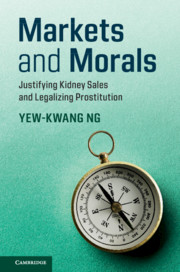Markets and Morals
Justifying Kidney Sales and Legalizing Prostitution
$125.00 (C)
- Author: Yew-Kwang Ng, Nanyang Technological University, Singapore
- Date Published: April 2019
- availability: Available
- format: Hardback
- isbn: 9781107194946
$
125.00
(C)
Hardback
Other available formats:
Paperback, eBook
Looking for an examination copy?
If you are interested in the title for your course we can consider offering an examination copy. To register your interest please contact [email protected] providing details of the course you are teaching.
-
Considering efficiency, equality, and morality, this book argues for qualified market expansion, particularly in legalizing kidney sales and prostitution. Legalizing prostitution will benefit both men and women, as argued in a chapter jointly written with Yan Wang. Blood donation without monetary compensation can still result in adequate blood supply if schools educate children that blood donation can actually benefit a donor's health. As a society becomes more advanced, with higher incomes and a better educated populace, more activities can be subject to market exchange, with gradual popular acceptance. Without serious misinformation and irrationality, inequality/fairness as such cannot be a valid reason for limiting the scope of the market. The book supports the use of markets to increase efficiency while also increasing the effort to promote equality, making all income groups better off.
Read more- Explores how kidney sales and legalized prostitution in particular would significantly increase social welfare while considering efficiency, equality and morality
- Extends economic analysis to include such effects as the possible crowding out of intrinsic motivation and morality in using the market, thus helping to reduce the anti-market sentiments that might be based on mistaken views
- Argues that the progression of society through higher degrees of division of labor, higher incomes, better education, more liberalism, and more understanding of economics will typically allow a wider scope for using markets
Reviews & endorsements
'Critics of commodification often simply state their prejudices against certain markets. They offer indictments without evidence. And they rarely think through the downsides of their proposals. In this thorough and well-researched book, Yew-Kwang Ng demonstrates that there are feasible ways to commodify various taboo products and services, which would save lives, help the poor, and generate excellent consequences for all involved. Adopting Yew-Kwang Ng’s policy ideas would do a tremendous amount of good.' Jason Brennan, Georgetown University
See more reviews'Yew-Kwang Ng has one of the most original minds that I have ever encountered. In this stimulating and highly readable book, Ng puts his mind to the task of puncturing many of the shibboleths that have been put forward against the use of markets to allocate goods and services like human organs and sexual favors. Ng is a hard-wired utilitarian, and illustrates in this excellent book how the utilitarian perspective can shed much-needed light on the morality of using market exchange in controversial situations such as these. Anyone who has been troubled by the extension of markets into these areas should read this book.' Dennis C. Mueller, Universität Wien
Customer reviews
Not yet reviewed
Be the first to review
Review was not posted due to profanity
×Product details
- Date Published: April 2019
- format: Hardback
- isbn: 9781107194946
- length: 220 pages
- dimensions: 235 x 156 x 15 mm
- weight: 0.44kg
- contains: 2 b/w illus. 1 table
- availability: Available
Table of Contents
Preface
Acknowledgements
1. Introduction
2. The well-known case of lateness fees
3. Extending economic analysis
4. The anti-market sentiment
5. The inequality/exploitation case against commodification is invalid
6. Repugnance? Similar to 'honour' killing
7. Crowding out or crowding in?
8. Market expansion is a mark of progress
9. The case for legalising kidney sales
10. Making presumed consent the default option
11. Blood donation
12. Prostitution Yan Wang and Yew-Kwang Ng
13. Conscription
14. Profiteering
15. Water: a typical case of under-pricing
16. Fines, imprisonment, or whipping?
17. Some specific areas
18. Concluding remarks.
Sorry, this resource is locked
Please register or sign in to request access. If you are having problems accessing these resources please email [email protected]
Register Sign in» Proceed
You are now leaving the Cambridge University Press website. Your eBook purchase and download will be completed by our partner www.ebooks.com. Please see the permission section of the www.ebooks.com catalogue page for details of the print & copy limits on our eBooks.
Continue ×Are you sure you want to delete your account?
This cannot be undone.
Thank you for your feedback which will help us improve our service.
If you requested a response, we will make sure to get back to you shortly.
×







